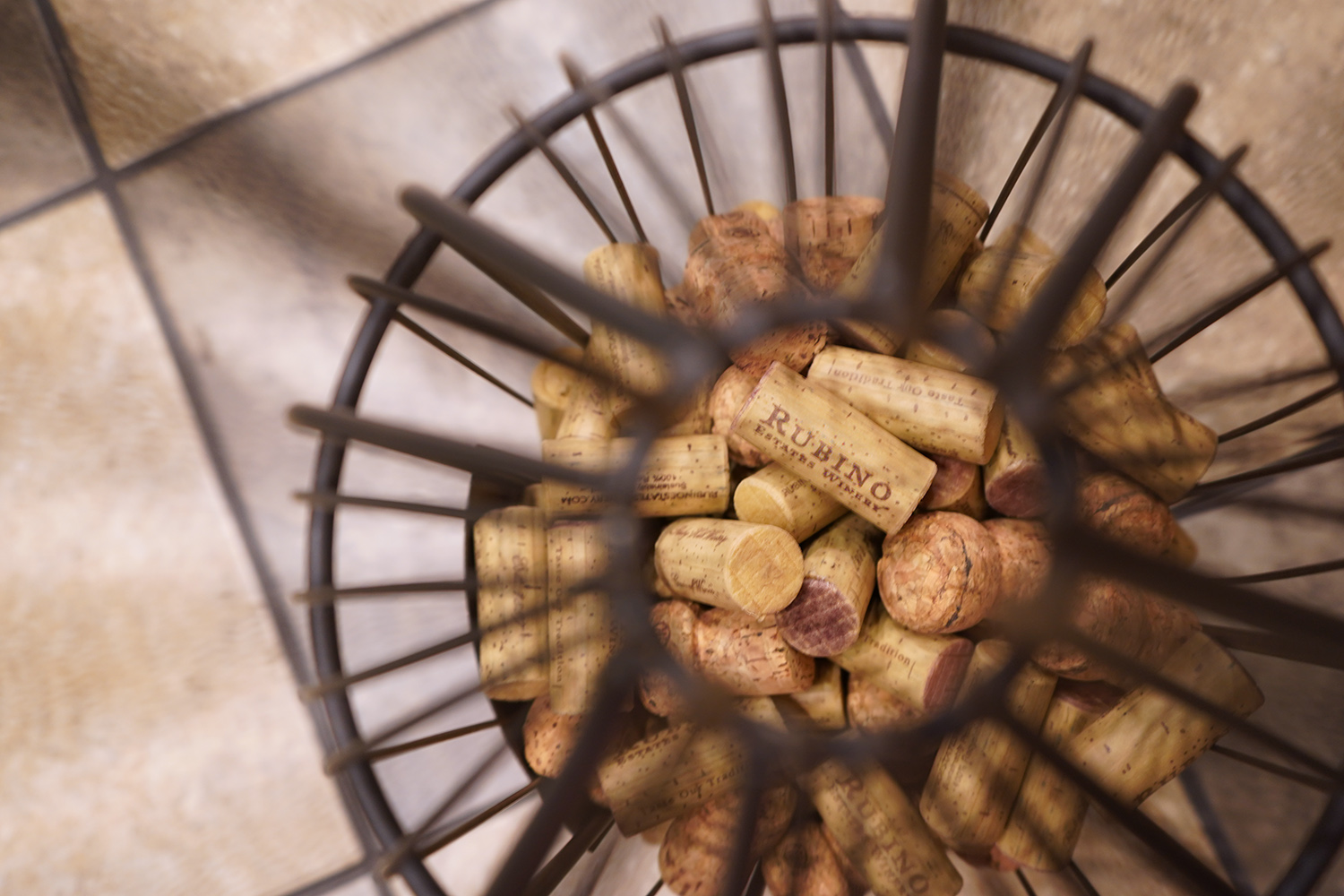Petite Sirah Spotlight
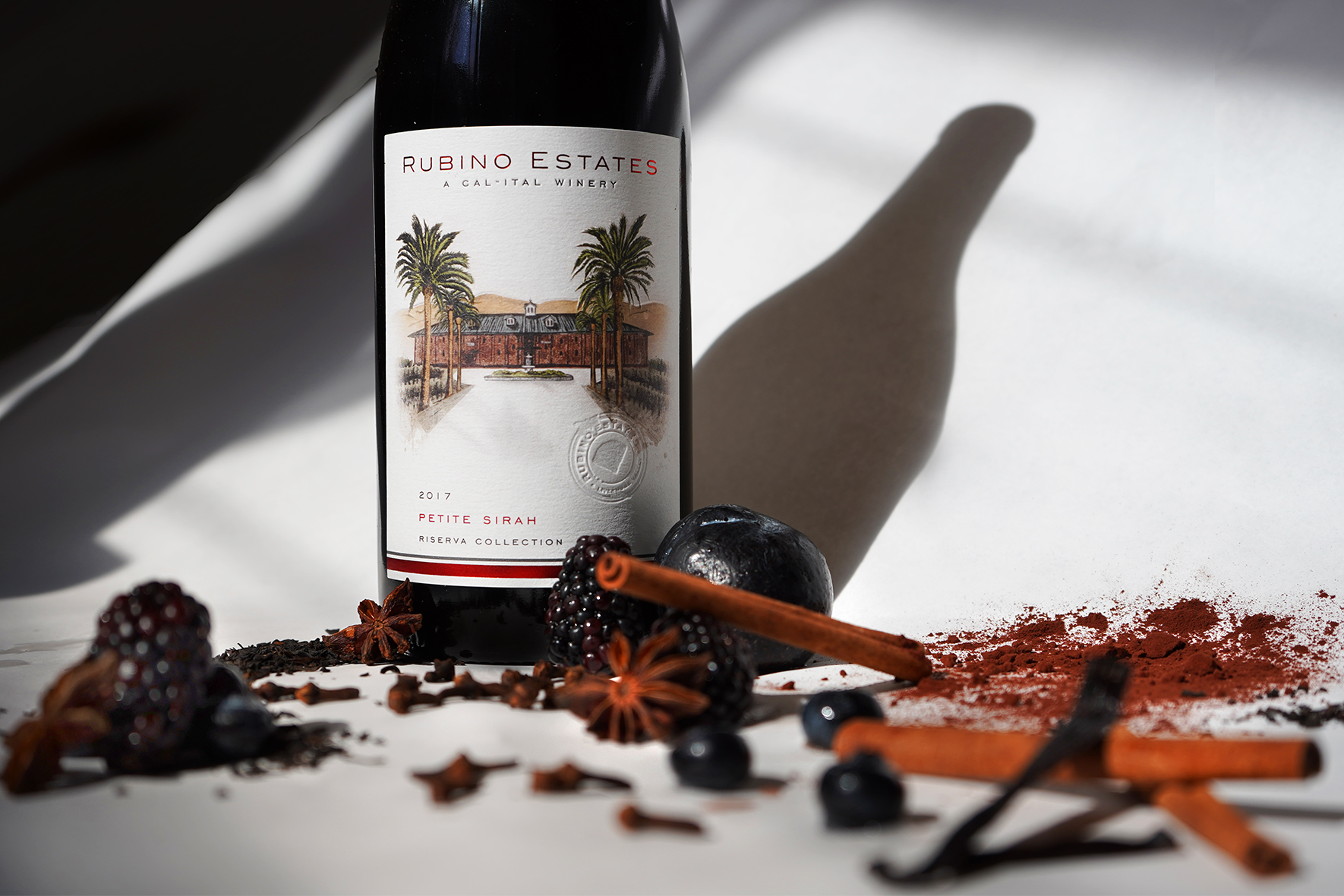 As October winds down, we are taking time this week to celebrate our Wine of the Month: Riserva Petite Sirah. Not only has this delectable wine earned a 94-point score from Wine Enthusiast, it has gained popularity and attention from our beloved members and guests. This deep, rich red is especially perfect this time of year as the weather encourages us to stay inside and get cozy. This wine is overflowing with everything you want in a Petite Sirah, dense with flavor and balanced body. If you haven't had a chance to taste our 2017 Riserva Petite Sirah, you can expect to be delighted when you do. Generous aromas of cocoa, baking spices, vanilla and dark fruit adorn the nose of this wine, leading into a swirling celebration on the palate. Luxurious flavors of tea leaves and tamarind mingle together before arriving at a finish with a satisfying finale of cocoa, cream and vanilla flavors.
As October winds down, we are taking time this week to celebrate our Wine of the Month: Riserva Petite Sirah. Not only has this delectable wine earned a 94-point score from Wine Enthusiast, it has gained popularity and attention from our beloved members and guests. This deep, rich red is especially perfect this time of year as the weather encourages us to stay inside and get cozy. This wine is overflowing with everything you want in a Petite Sirah, dense with flavor and balanced body. If you haven't had a chance to taste our 2017 Riserva Petite Sirah, you can expect to be delighted when you do. Generous aromas of cocoa, baking spices, vanilla and dark fruit adorn the nose of this wine, leading into a swirling celebration on the palate. Luxurious flavors of tea leaves and tamarind mingle together before arriving at a finish with a satisfying finale of cocoa, cream and vanilla flavors.
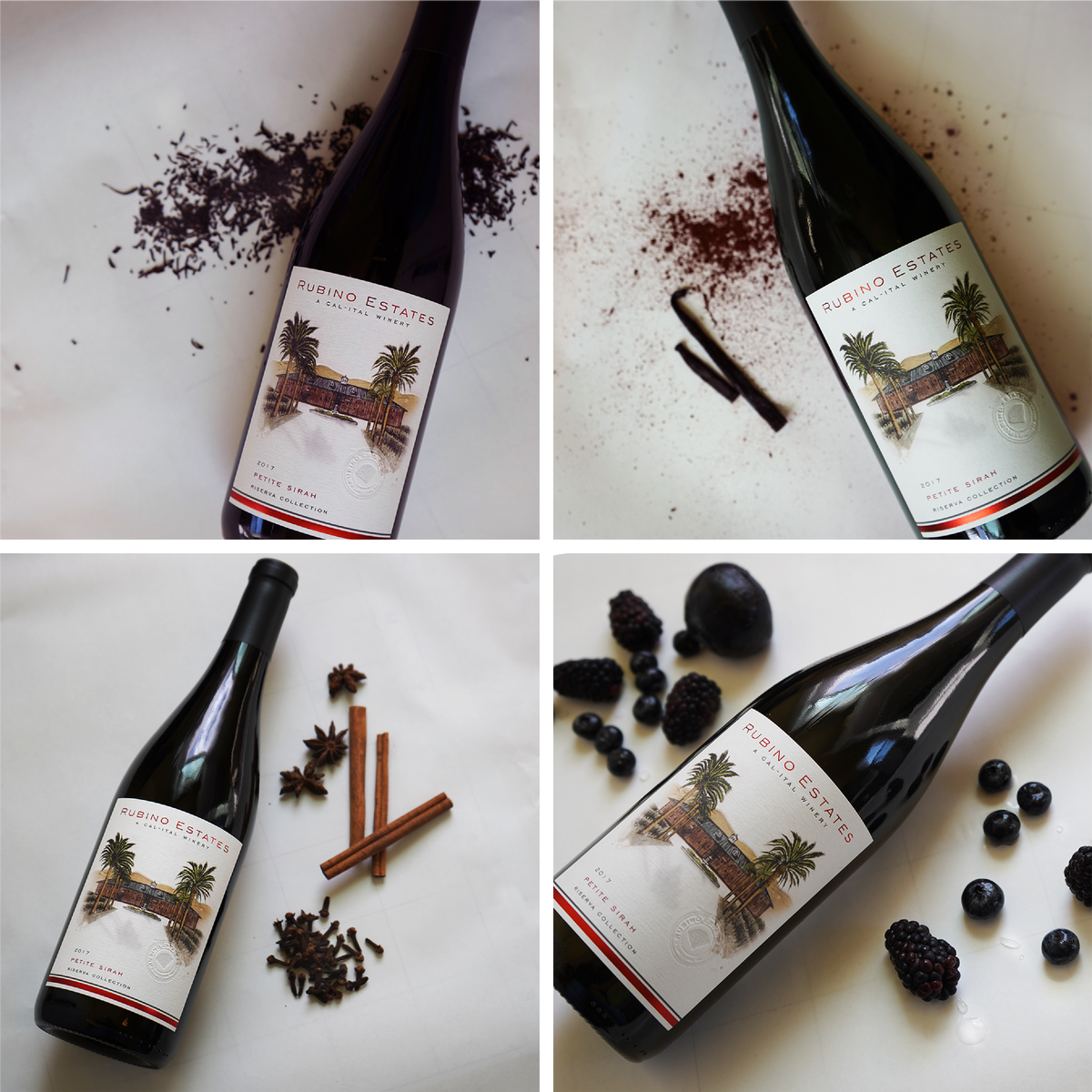
Petite Sirah is anything but “petite” on the palate. This name was earned in the late 1800s due to the size of the grapes themselves in comparison to Syrah grapes. The small size of the grapes and the thickness of the skin is the source of the deep, iconic tannin. Petite Sirah is known for its density, boldness, and body, and rightly so. The complexity and power within each bottle of our Petite Sirah are a product of varietal, terroir, and winemaking finesse. Though Petite Sirah hails from France, the Californian climate is a happy place for the vines, and the wine itself has found more of a foodhold in New World markets rather than finding popularity in the Old World. Today, it is the 6th-most planted red varietal in California, a number which, in our opinion, should go up.
Our 2017 Riserva Petite Sirah is an orchestra of flavor, with everything from tea leaves to dark fruit and baking spices topped with vanilla and cocoa. Don’t miss this underappreciated varietal. You might just find a new favorite!
Creepy Crawly Appreciation
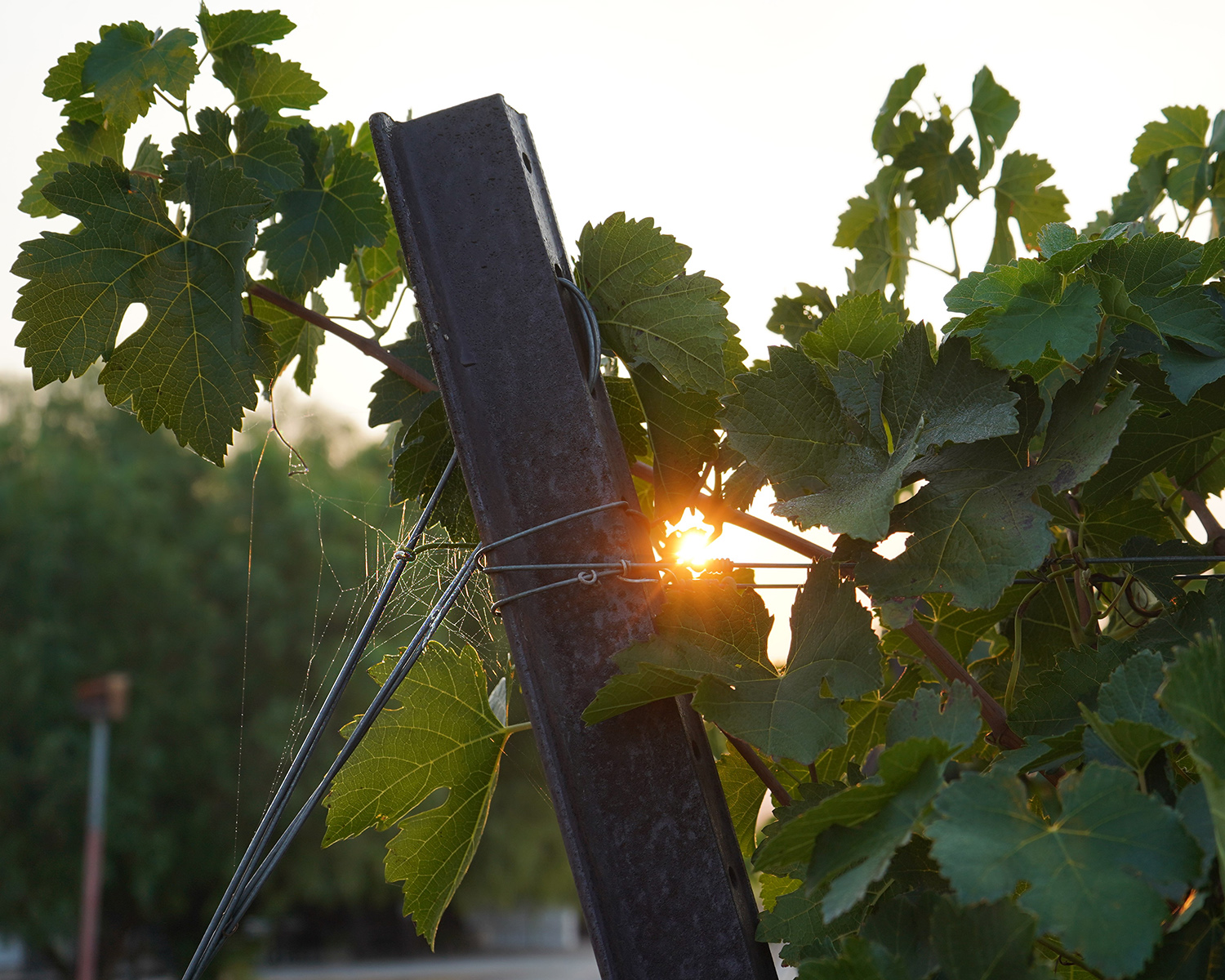 As the end of October approaches, we like to refer to this time as the "Spooky Season!" In the spirit of this season, we want to express our appreciation for the creepy crawly critters that reside around the Estate. From snakes to spiders, it’s time to share our ode to the odious!
As the end of October approaches, we like to refer to this time as the "Spooky Season!" In the spirit of this season, we want to express our appreciation for the creepy crawly critters that reside around the Estate. From snakes to spiders, it’s time to share our ode to the odious!
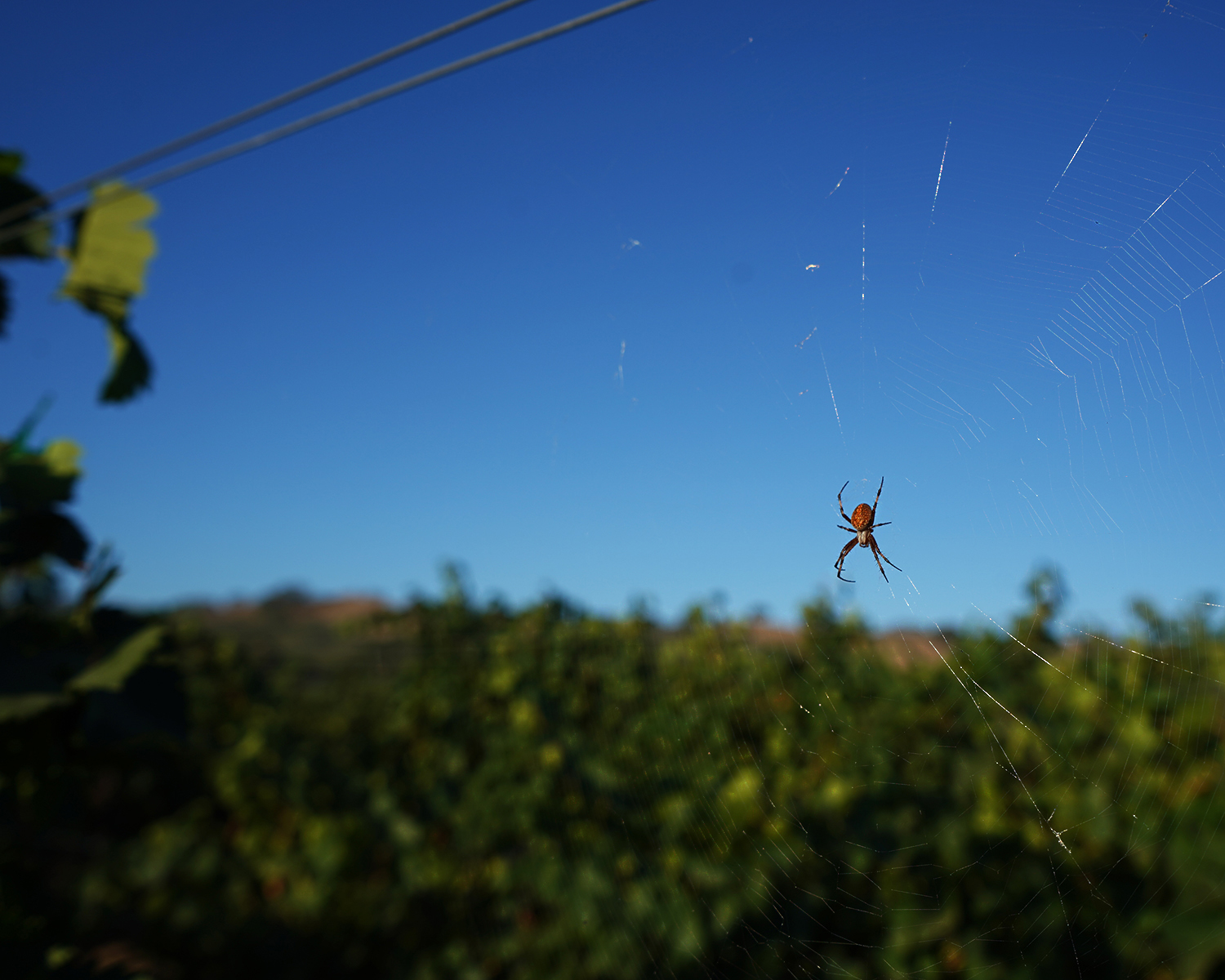 Let’s start with SPIDERS! These little beauties have a bad rap, but that is mostly undeserved. One study out of UC Berkeley found that most spiders (98%) you come across in daily life are completely safe! Additionally, spiders eat the bad bugs that are threats to people and grapevines. In the vineyard, spiders are a fantastic insecticide, making them a natural and sustainable alternative to chemical treatments.
Let’s start with SPIDERS! These little beauties have a bad rap, but that is mostly undeserved. One study out of UC Berkeley found that most spiders (98%) you come across in daily life are completely safe! Additionally, spiders eat the bad bugs that are threats to people and grapevines. In the vineyard, spiders are a fantastic insecticide, making them a natural and sustainable alternative to chemical treatments.
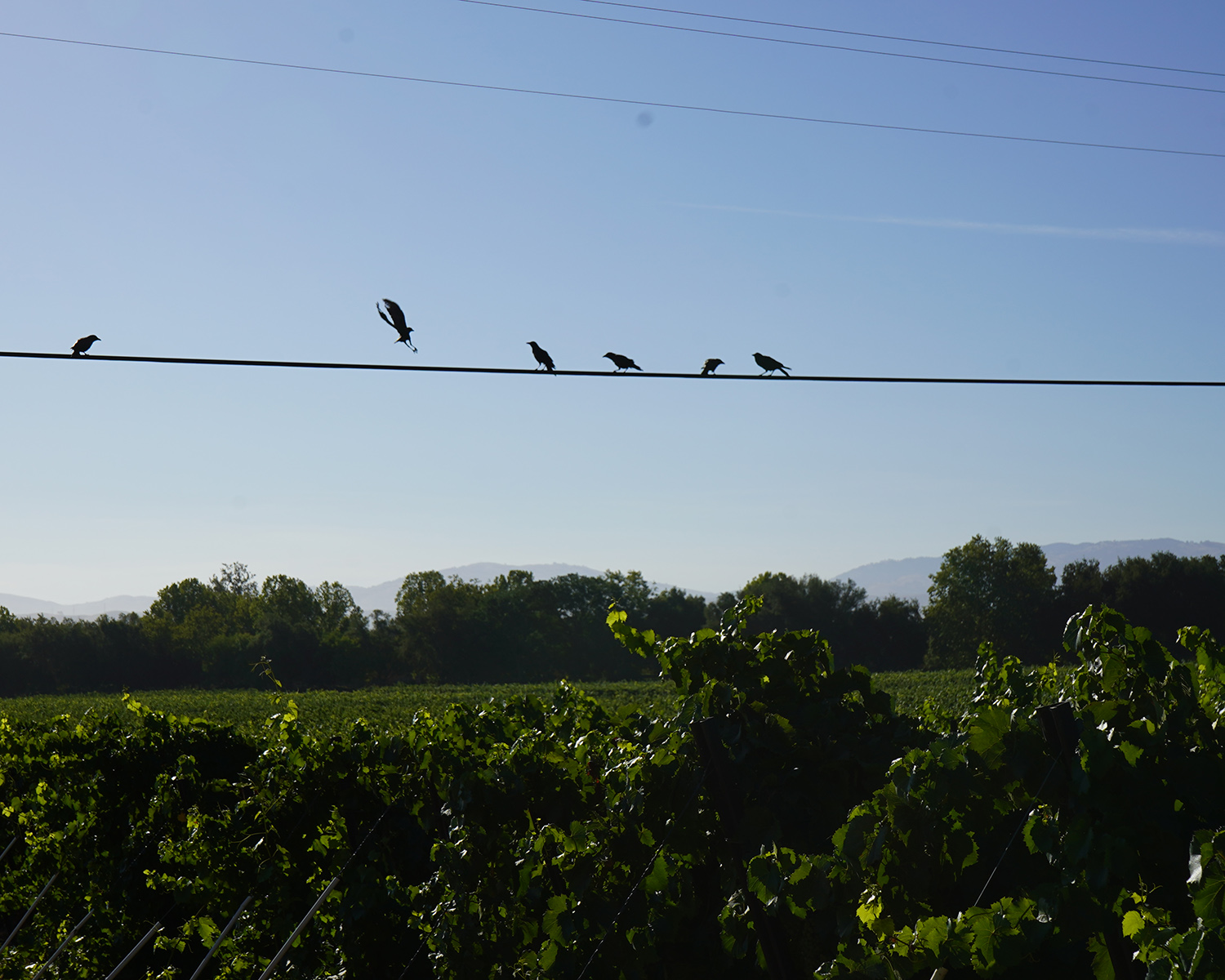 What about the spooky CORVID fiends, crows and ravens? These birds are truly worth admiring. In addition to a wonderful wild ambience, crows cast a watchful eye over the vineyards. When we drop fruit a month prior to harvest, our corvid cleanup crew is quick to clear the rows of the pruned clusters. With a complex social system and peculiarly intriguing intelligence, these avian watchers are welcome to call the Estate their home.
What about the spooky CORVID fiends, crows and ravens? These birds are truly worth admiring. In addition to a wonderful wild ambience, crows cast a watchful eye over the vineyards. When we drop fruit a month prior to harvest, our corvid cleanup crew is quick to clear the rows of the pruned clusters. With a complex social system and peculiarly intriguing intelligence, these avian watchers are welcome to call the Estate their home.
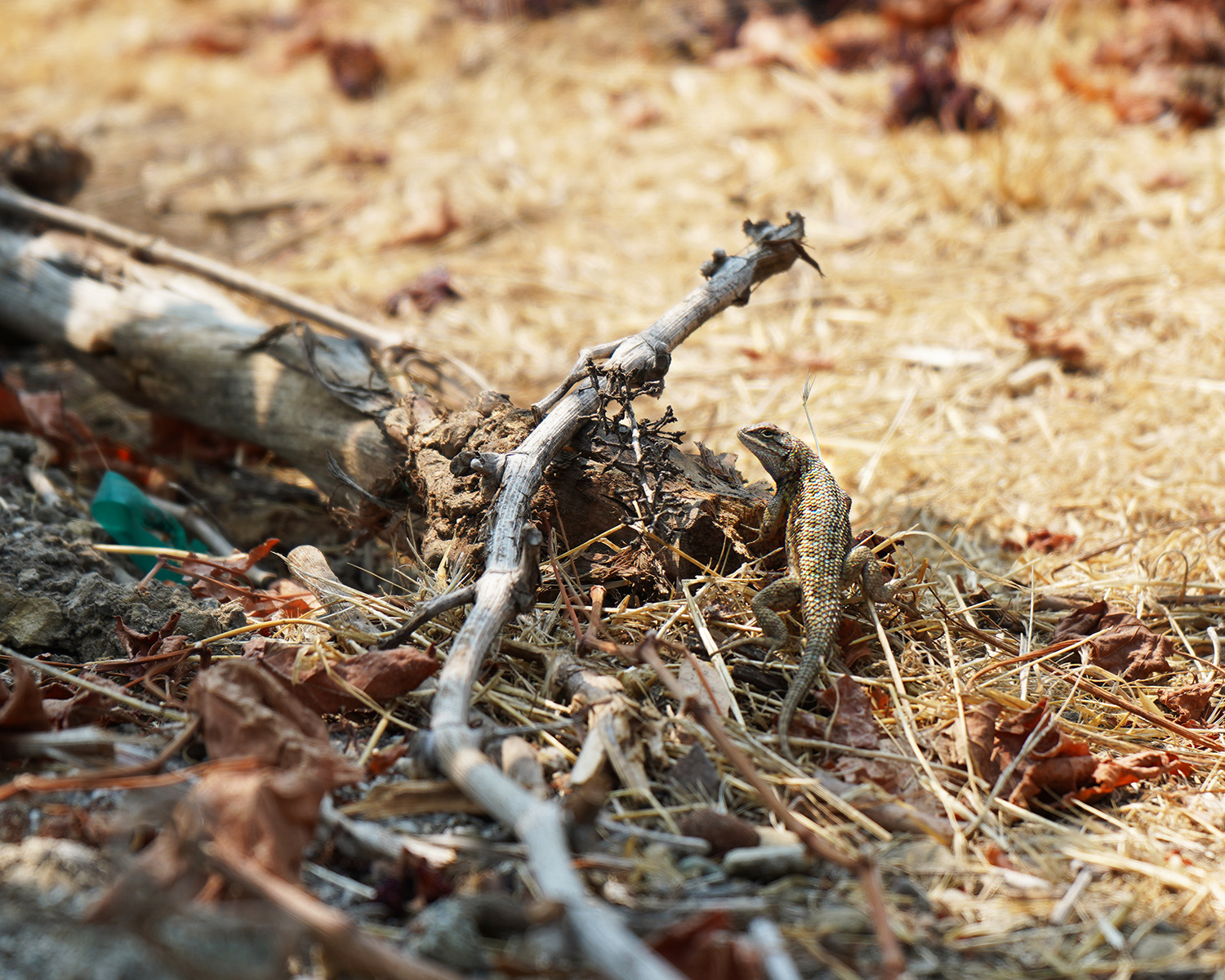 Next, we consider the LIZARDS who can often be spotted scuttling across the rocky soil in the afternoon like the fellow above who was sunning himself among the Petite Sirah vines. In addition to being completely harmless to humans, our lizards are excellent hunters of little pests like slugs and harmful bugs. Lizards are also very delicate creatures, sensitive to soil pollutants (such as chemical treatments) and so the presence of lizards is a good indicator of the vineyard’s health.
Next, we consider the LIZARDS who can often be spotted scuttling across the rocky soil in the afternoon like the fellow above who was sunning himself among the Petite Sirah vines. In addition to being completely harmless to humans, our lizards are excellent hunters of little pests like slugs and harmful bugs. Lizards are also very delicate creatures, sensitive to soil pollutants (such as chemical treatments) and so the presence of lizards is a good indicator of the vineyard’s health.
 We also look to the elusive BOBCATS who make occasional appearances in the vineyard. This photo was taken by our Winemaker, whose home is situated within the Estate vineyards. These beautiful creatures are a top predator for larger pests like squirrels. They are also highly intelligent and naturally balance the food chain by reproducing very sparingly.
We also look to the elusive BOBCATS who make occasional appearances in the vineyard. This photo was taken by our Winemaker, whose home is situated within the Estate vineyards. These beautiful creatures are a top predator for larger pests like squirrels. They are also highly intelligent and naturally balance the food chain by reproducing very sparingly.
 The presence of VULTURES is also an important one. Just as corvids pick up decaying fruit, the vultures take care of the even bigger messes with efficiency. This natural janitorial crew is a sustainable garbage disposal, with thorough and quick cleanup. Their work is vital to prevent the spread of decay-borne diseases and, of course, odor.
The presence of VULTURES is also an important one. Just as corvids pick up decaying fruit, the vultures take care of the even bigger messes with efficiency. This natural janitorial crew is a sustainable garbage disposal, with thorough and quick cleanup. Their work is vital to prevent the spread of decay-borne diseases and, of course, odor.
 Lastly, a few slippery, slithery SNAKES also call our soil their home. The scaly resident above was spotted just outside his hole in the Cabernet block on a chilly morning. These creatures reduce the use of pollutants and preserve soil health by preying on mice and other ground pests. Additionally, snakes are an important part of ecological balance. They eat the little pests, but also become snacks for birds of prey.
Lastly, a few slippery, slithery SNAKES also call our soil their home. The scaly resident above was spotted just outside his hole in the Cabernet block on a chilly morning. These creatures reduce the use of pollutants and preserve soil health by preying on mice and other ground pests. Additionally, snakes are an important part of ecological balance. They eat the little pests, but also become snacks for birds of prey.
As a Certified California Sustainable Vineyard, we are careful to pay attention to the health of our vineyard and the critters that call it home. Though the heebie-jeebies may strike, try to thank a creepy crawly today!
Old Cork, New Cork
Whether you are new to the wine scene or have been enjoying vino for decades, you probably have some idea of what different bottle closures mean to you. There are several options commonly seen throughout the wine world and the industry seeks to balance their elegance, budget, and environmental impact. Whether you turn up your nose at a screw cap or break a corkscrew in a plastic composite stopper, a brief look into what these closures mean is a fascinating investigation.
Natural Corks
These classic stoppers became the gold standard for sealing wines in the 1800s, appropriately around the same time that modern corkscrews were developed. Natural cork is harvested from a variety of oak colloquially referred to as a "cork oak" which regenerates its spongy bark continually and can be harvested about once every decade. Producing natural corks can be a resource-intensive process, but the material is biodegradable. Some wine experts favor natural corks for their long-term aging wines because the tiny pores in the material allow miniscule amounts of air through, allowing the wine to develop over the years. On the other hand, this means that with the variation in the product there is a possibility for a variety of cork taints, making beautiful wine undrinkable.
Composite Corks
Composite corks come in several different forms depending on the budget and preferences of the winemaker. These corks are also sometimes referred to as agglomerated corks, and incorporate ground up cork particles, sometimes mixed with other similar substances. These stoppers behave more like natural cork than other closure options, but with more consistency within the product. Champagne corks are traditionally composite corks, made of ground up natural corked and sealed with a food-safe adhesive. Most agglomerated corks are best used in wines that will be enjoyed young, as they break down more quickly than natural corks, though the technology continues to develop.
Screw Caps
Though plagued by a stigma of being sub-par, screw caps do offer some advantages. One of the biggest risk factors in aging wine is oxidation, when too much air interacts with the wine and causes spoilage or even slightly off flavors. In the research done to compare and contrast various mainstream wine closures, screw caps have been shown to be the most effective for keeping wines safe from air. If you are going for a screw cap wine, white or rosé wines can be enjoyed for more years, as the screw top sealed bottles preserve the aromatic dynamics of the wine. There is some question if screw caps are the best for red wines because reds benefit from a tiny seep of oxygen, as referenced above in the discussion of natural corks.
Synthetic Corks
As with composite corks, there are several varieties of synthetic corks that are widely available. Some synthetic corks are made from malleable plastics that mimic the porous nature of natural cork without the variability or risk of cork taint. Other synthetic cork varieties create this effect using only natural, biodegradable materials. Here at Rubino Estates, almost every wine is sealed with cork made from sustainable materials derived from sugarcane. This is one of many measures we take to do our part in reducing negative environmental impact at every stage of the winemaking process.
Essential Books About Wine
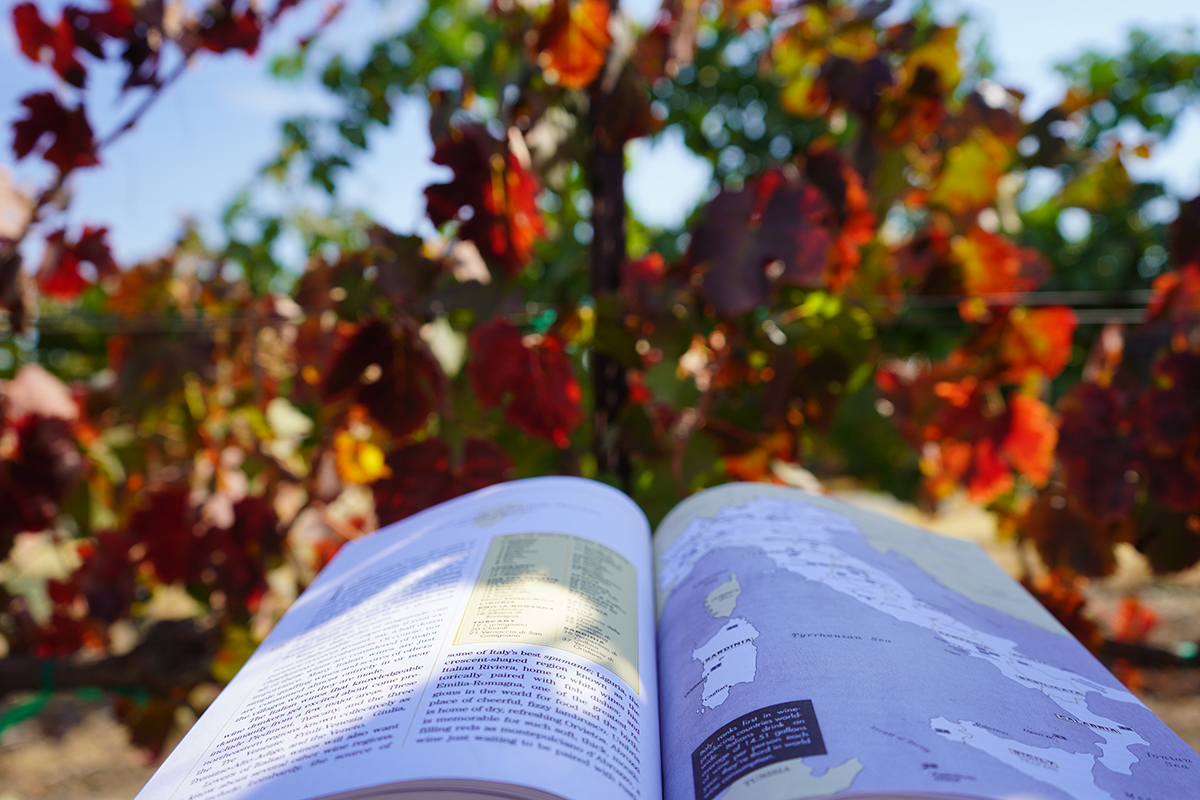 If you’re not already a bookworm, fall is the perfect time to get a reading habit started. There’s nothing cozier than a comfy sofa, a good book, and a glass of wine. This week, we’re bringing you book recommendations for wine lovers! There is something for everyone.
If you’re not already a bookworm, fall is the perfect time to get a reading habit started. There’s nothing cozier than a comfy sofa, a good book, and a glass of wine. This week, we’re bringing you book recommendations for wine lovers! There is something for everyone.
If you want a fiction book:
Nose: A Novel
This witty mystery is set in the wine Country of Northern California (near and dear to our hearts) and swirls with discussion of excellent wine. Enjoy it as a “delectable, and fast-paced novel that, like a good Cabernet, only grows truly enjoyable once opened.”
If you want a coffee table book:
The Impossible Collection of Wine
If you’re looking for a book that is big, beautiful, and makes both guests and yourself say “wow” then this book is for you! This collection of wines imagines a cellar that doesn’t exist, a cellar full of the best vintages of the best wines of all time.
If you want a good book for beginners:
Wine Simple: A Totally Approachable Guide from a World-Class Sommelier
This book is exactly what it promises to be! If you feel like diving into the world of wine but you aren’t sure where to start, crack open this book. Enjoy rich descriptions in common language without any pretentious flair. Wine is meant to be enjoyed!
If you want a book for quick reference:
The Wine Bible
This award-winning book is bursting at the seams with all the info you could hope for, broken down by region and varietal the world over. Most of all, it’s entertaining! Next time you pour a glass for a guest, pull out this book too, and let it do the talking.
If you want a book of science:
Proof: The Science of Booze
For our brainy wine lovers, we recommend diving into the processes behind crafting your favorite beverages. With a little bit of curiosity, wonder, and humor, you’ll get a peek into the science of what goes on behind the scenes and under the microscope.
If you want a book for everyone:
Wine Folly: The Essential Guide to Wine
From the creators of the Wine Folly website, this book is fun and full of information that brings your experience of wine to the next level. Whether you are a beginner or a seasoned wine snob, you are sure to enjoy the easy and fascinating reading inside.
Whether you're looking for information or just a good time, there's a book for you. Happy reading!
What does your reading list look like? Show us @RubinoEstates.
Spaghetti & Meatballs with Petite Sirah
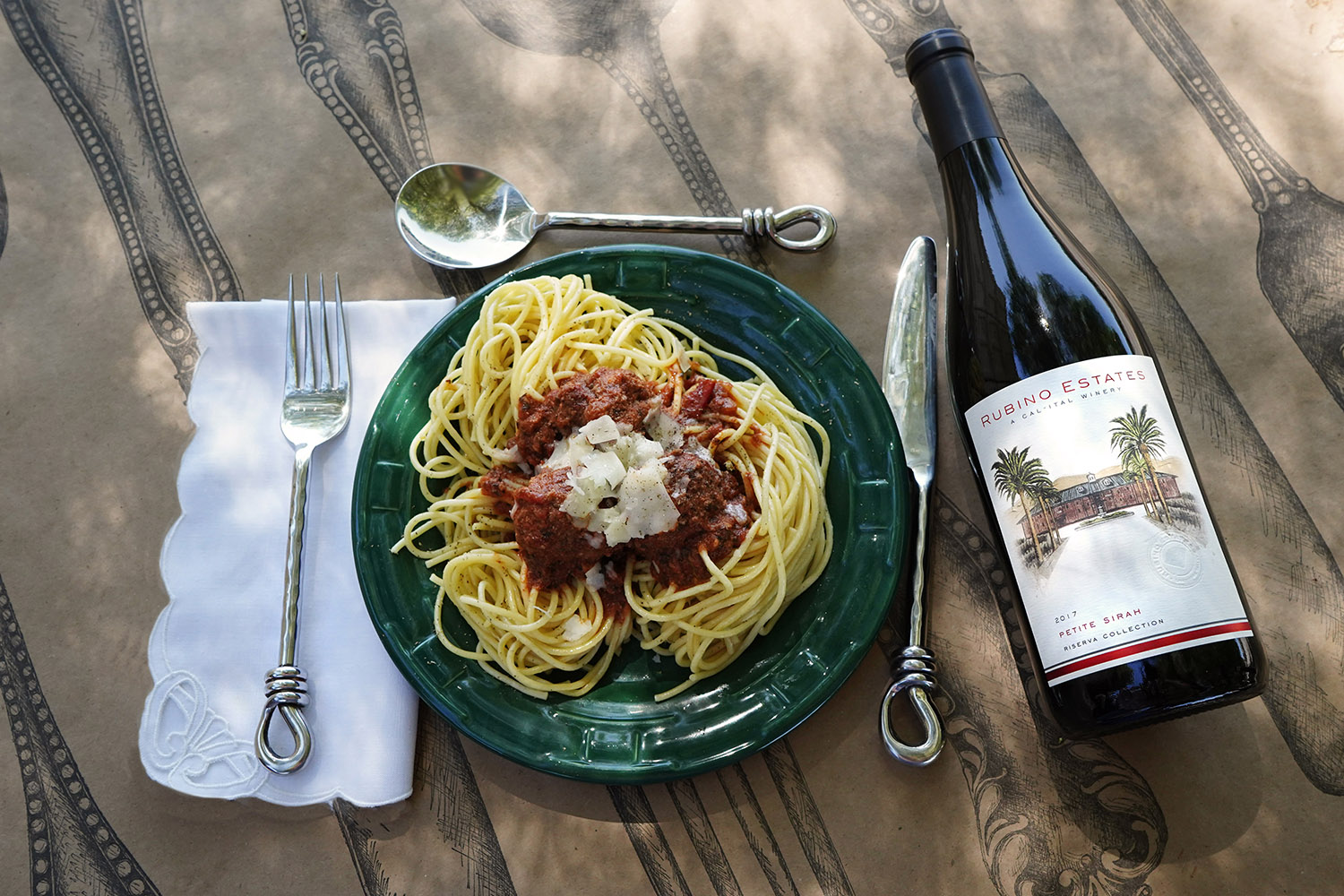 Now that it's October, we firmly believe that it is the perfect time to pull out all of our favorite comfort food recipes. From rich stew to pumpkin pie, we're ready for the cuisine of autumn. This week, we are using this as an excuse to take advantage of our new Wine of the Month and cook up our favorite slow cooker Petite Sirah Meatballs. Full of flavor and lots of love, these meatballs are easy and so delicious you'll need another helping. Buon appetito!
Now that it's October, we firmly believe that it is the perfect time to pull out all of our favorite comfort food recipes. From rich stew to pumpkin pie, we're ready for the cuisine of autumn. This week, we are using this as an excuse to take advantage of our new Wine of the Month and cook up our favorite slow cooker Petite Sirah Meatballs. Full of flavor and lots of love, these meatballs are easy and so delicious you'll need another helping. Buon appetito!
Rubino Estates Slow Cooker Meatballs
Ingredients
- For the Meatballs
- 1 lb ground wagyu beef
- 1 lb ground pork
- 2 eggs
- ¼ cup Italian bread crumbs
- ¼ cup parmesan cheese
- 1/2 cup finely chopped sun-dried tomatoes
- 1/2 teaspoon smoked salt
- 4 cloves of garlic, minced
- 1 teaspoon dried parsley
- ¼ teaspoon dried basil
- ¼ teaspoon dried fennel
- ⅛ teaspoon dried oregano
- pinch red pepper flake
- For the Sauce:
- 24 ounces of preferred red pasta sauce (yes, store bought is fine!)
- ½ cup Rubino Estates Riserva Petite Sirah
- 2 whole bay leaves
Instructions
- In a large bowl, thoroughly combine all ingredients for the meatballs, making sure to completely incorporate each ingredient. We recommend using your hands, and washing thoroughly afterward.
- Add the sauce, Petite Sirah, and bay leaves to a large slow cooker set to low and stir.
- Using your hands or a scoop, shape the meat into uniform meatballs and place them into the sauce.
- When all of the meatballs have been placed into the sauce mixture, cover and let cook on low for 6-8 hours. If you're in a hurry, cook on high for 4 hours.
(click here for a downloadable recipe card!)
We like to serve these with spaghetti because we appreciate a classic! Top with a hearty helping of fresh parmesan and fresh cracked black pepper, and your dish will shine.
If you're as hungry as we are now, then it's probably time to take advantage of the
wine of the month sale for yourself! Our Riserva Petite Sirah is worth it. 
